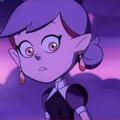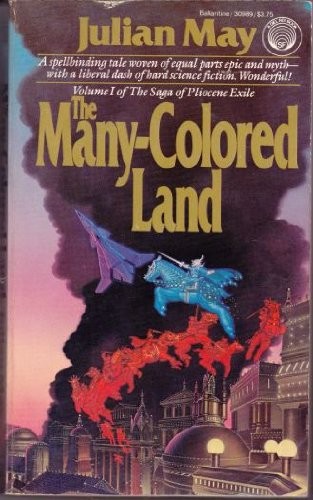Orlion reviewed THE MANY-COLORED LAND by Julian May
Review of 'The Many-Colored Land (The Saga of Pliocene Exile, Vol. 1)' on 'Goodreads'
4 stars
The Many-Colored Land is a time travel/alien invasion/political intrigue/what-the-genre-is-this? novel. It is the first of four books comprising the Saga of the Pliocene Exiles. As the first book, it sets up the setting and some of the conflicts for the following books.
We begin our story six million years ago when some alien refugees and their dying space ship from another galaxy land on a planet (presumably Earth).
We then jump forward six million years to 2110, when the human race is part of a Galactic Milieu that is composed of five other alien races. This is a Golden Age for humanity, one that pisses off humans yearning for a simpler time when they could just speak French and be xenophobic assholes. Luckily for them, a "one way" time portal has been made on Earth that can transport these social outcasts six million years in the past to the Pliocene era, where they can leave behind the galactic civilization behind that they hate so much and pursue their individual dreams...
But once in the past, they find that the human time travelers have been enslaved by a new race of aliens known as the Tanu. They use humans to grow their food, mine their minerals, fight their battles, and be impregnated with their children. But some humans have escaped enslavement and joined forces with some of the Tanu's enemies in an attempt to free humanity from the yoke of Tanu servitude... whether they want it or not.
As you can tell, the story and perhaps the mood of the story jumps around a lot in this novel. It centers around eight of the Exile time travelers, each having their own reason to choose or be forced into taking this trip. Not knowing what awaits them, the first part of the novel deals with them making the decision to be Exiled and saying good bye to the worlds they have known and some of the comforts they will be leaving behind forever. It is intriguing, poignant, and sometimes inspirational in its romanticizing.
But there is no survivalist drama to be had in this series. Unlike in other 'libertarian' time travel stories like [b:Farnham's Freehold|50840|Farnham's Freehold|Robert A. Heinlein|http://d.gr-assets.com/books/1170371993s/50840.jpg|2942974] our protagonists face off almost immediately with their antagonists. Any world building is done through the travel done by the characters as they are split into two groups. Eventually, the reader gets caught up in a rebellion storyline which concludes the novel and the setup for the series.
I found this to be an intelligent and quick read. Julian May, aside from having a terrific command of the English language, has also done plenty of research to help make her world of Pliocene Europe seem real to the readers. Even the alien cultures are given life by associating them with various Celtic folklore. The character variety is also satisfying. Each character is unique and rounded, with different races and sexual orientations thrown into the mix in a natural manner. Julian May is not necessarily writing a civilly progressive novel, but the way she treats writing different characters from different cultures as individual human beings with individual desires that define them is very refreshing and probably was/is ahead of its time. Each character is not merely the sum of its femininity/masculinity/homosexuality, rather each of those is part of a bigger whole.

